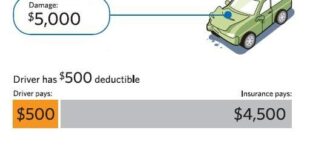Car Insurance for New Drivers: Essential Guide to Getting the Best Coverage. Getting car insurance for new drivers is a crucial step towards ensuring safety on the road and compliance with legal requirements. For newly licensed drivers, understanding the intricacies of car insurance can be overwhelming. This guide aims to simplify the process by providing comprehensive information on choosing the right policy, factors affecting premiums, and tips for finding the best coverage.
Understanding Car Insurance for New Drivers
Car insurance is a contract between the driver and an insurance company where the driver pays a premium in exchange for financial protection against various risks associated with driving. For new drivers, insurance new driver coverage is essential not only for legal compliance but also for financial protection in case of accidents or damage.
Types of Car Insurance Coverage
- Liability Insurance: Covers damages to other people and property if you are at fault in an accident. This is mandatory in most places.
- Collision Coverage: Pays for repairs to your vehicle after an accident, regardless of who is at fault.
- Comprehensive Coverage: Covers damage to your vehicle from non-collision incidents such as theft, vandalism, or natural disasters.
- Uninsured/Underinsured Motorist Coverage: Protects you if you’re involved in an accident with a driver who lacks adequate insurance.
- Personal Injury Protection (PIP): Covers medical expenses for you and your passengers, regardless of who caused the accident.
Factors Affecting Car Insurance Premiums for New Drivers
- Age and Gender: Young drivers, especially males, typically face higher premiums due to statistical risk factors.
- Driving Record: A clean driving record helps in securing lower rates, while traffic violations or accidents can increase premiums.
- Type of Vehicle: The make, model, and safety features of the vehicle impact the insurance cost. More expensive or high-performance cars generally incur higher premiums.
- Location: Insurance rates can vary based on where you live. Urban areas with higher traffic densities usually result in higher premiums.
- Coverage Limits: Higher coverage limits and lower deductibles can increase the cost of insurance.
Tips for New Drivers to Save on Car Insurance
- Shop Around: Compare quotes from multiple insurers to find the best deal.
- Look for Discounts: Many insurers offer discounts for good grades, safe driving courses, or bundling policies.
- Consider a Higher Deductible: Increasing your deductible can lower your premium, but ensure you can afford the higher out-of-pocket expense if you make a claim.
- Maintain a Clean Driving Record: Avoid accidents and traffic violations to keep your rates low.
- Choose a Safe Vehicle: Opt for cars with high safety ratings and advanced safety features.
- Use Telematics Programs: Some insurers offer discounts for installing devices that monitor driving behavior.
- Join a Parent’s Policy: Being added to a parent’s insurance policy can be cheaper than getting your own.
- Drive Less: Reducing your annual mileage can help lower your premium.
- Take Advantage of Safety Courses: Completing defensive driving courses can lead to discounts.
- Review Your Policy Regularly: Periodically reassess your coverage needs and shop around for better rates.
FAQs about Car Insurance for New Drivers
- What is the minimum car insurance required for new drivers?
- The minimum requirement varies by state or country, but typically includes liability insurance to cover damage to others in an accident.
- How can new drivers find the best insurance rates?
- Compare quotes from multiple insurers, look for discounts, and consider various coverage options to find the best rates.
- Why are car insurance premiums higher for new drivers?
- New drivers are statistically more likely to be involved in accidents, which increases their risk profile and insurance costs.
- What should new drivers consider when choosing coverage?
- New drivers should evaluate their budget, driving habits, and the value of their vehicle when selecting coverage.
- Is it cheaper to be added to a parent’s policy or to get a separate policy?
- Often, it’s cheaper for new drivers to be added to a parent’s policy due to combined discounts and lower overall rates.
- What discounts are available for new drivers?
- Discounts may include those for good grades, completion of driver’s education courses, or safe driving habits.
- How does my credit score affect my insurance premium?
- In many areas, a higher credit score can lead to lower insurance premiums, as insurers view it as an indicator of financial responsibility.
- What is a no-claims bonus and how can new drivers earn it?
- A no-claims bonus is a discount for not making any claims over a certain period. New drivers can earn it by maintaining a clean driving record.
- Can new drivers get insurance if they have a previous accident on their record?
- Yes, but they may face higher premiums. It’s important to shop around and compare different insurers.
- What should new drivers do if they are involved in an accident?
- Report the accident to your insurer, gather information from all parties involved, and document the scene to support your claim.
Conclusion
Car insurance for new drivers is an essential step in ensuring financial protection and legal compliance while on the road. By understanding the types of coverage available, factors affecting premiums, and implementing strategies to save on insurance costs, new drivers can make informed decisions that best suit their needs.
Choosing the right insurance policy involves careful consideration of various factors, including coverage options, vehicle type, and personal driving habits. By leveraging available discounts and maintaining a clean driving record, new drivers can manage their insurance expenses effectively. Regularly reviewing and adjusting your policy will help ensure that you always have the coverage you need at the best possible rate.
 oto car insurance used car repair
oto car insurance used car repair
